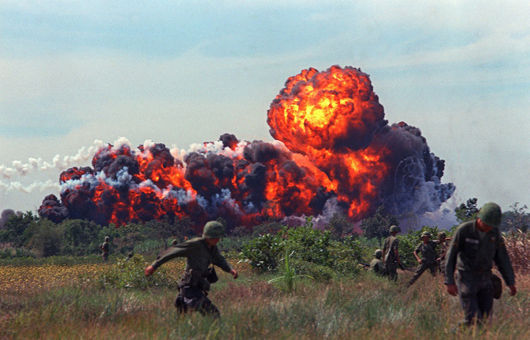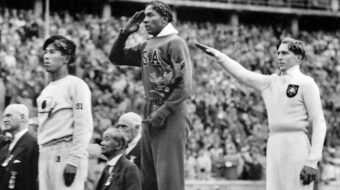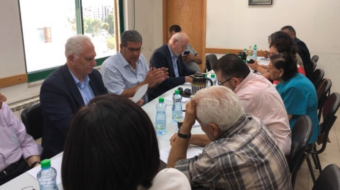
Last year I went to Vietnam. At Huế, site of fierce fighting during 1968’s Tết Offensive, I visited the Citadel via cyclo, a rickshaw/bicycle hybrid. I asked cyclo driver Trần Văn Thảo what he did during the Tết Offensive? The short, sturdy, gray-haired cyclo-ist replied: “I was in the Viet Cong.” After I told him I marched for peace when I was a teenager Thảo stuck out his hand, sincerely saying: “You’re a good friend to Vietnam. Thank you.”
Oh, there they were: Those magic words Uncle Sam, for 50-odd years, has still never managed to say to us. No expression of gratitude to the millions of Americans who demonstrated to save lives, for peace, against war and disastrous foreign policies that killed 58,000-plus U.S. soldiers and millions of Indochinese.
But the Vietnamese – victims of invasion, aggression and atrocities – haven’t forgotten us. Whenever I mentioned to a Vietnamese I’d opposed the war I was always politely thanked. At the Hanoi Hilton, near the display case exhibiting John McCain’s aviator’s uniform, is a wall of photo murals depicting Vietnam’s global friends protesting for peace – including Americans.
This April 30th marks 40 years since 1975’s end of the Vietnam War – the biggest foreign policy and military defeat in U.S. history. This 40th anniversary comes as Washington’s overseas policies again face serious setbacks. At an April 18th Los Angeles Times Festival of Books panel I asked former antiwar activist and California state legislator Tom Hayden “what lessons should be learned” from this anniversary?
“Our generation was lied to,” insisted the onetime Chicago 7 defendant. “Fathers, mothers didn’t expect to send sons to war by a president who lied. One has to wonder: ‘What was it all about?’ Three million people died. Couldn’t negotiations have worked?… How many people were thrown out of think tanks for stupid ideas? They’re still there. We need a collective apology and to credit people who were 20, who opposed the war. They should be honored: They knew more than those with ribbons on their chests and medals around their necks.”
In an email Hayden added, “Families of the dead are owed an apology for their sons having been sent into an unwinnable war… Those who were right – the antiwar movement – have never been credited for trying to prevent a disaster.”
The point of a collective apology by the U.S. government and military-industrial-media- think-tank-complex is not just to make “peaceniks” feel better, although that would be nice. More importantly, admission of wrongdoing and acknowledgement of colossal mistakes can help lead toward more enlightened policies that won’t endlessly, heedlessly waste lives and resources, resulting in more debacles.
After 1945 America has been in a state of near-perpetual war. Since Korea, despite infinite amounts of money, weapons and warriors squandered on imperial misadventures – usually against countries that never attacked us – America has actually not decisively won most of these wars. Those mindlessly saying “support the troops” with unconditional ballyhooing of administration and Pentagon policies are parrots, not “patriots.” What kind of “patriotism” and “support” mistakenly sends young Americans unnecessarily afar into harm’s way? How can anyone who claims to favor “small government” also believe America should be Earth’s self-appointed, self-anointed global cop? Talk about budget busting big government!
Just as children are taught apologizing is important for making things right, kids also know people should mind their own business. Nobody likes being bossed around by busybodies sticking their noses into others’ concerns, telling them what to do. Interlopers, intruders, invaders are widely despised. Smacking beehives with sticks is a surefire way to get stung. This, in a nutshell, has been U.S. foreign policy since 1945; uncorrected, it continues today, with cataclysmic consequences. Constantly intervening in others’ internal affairs is surely the road to rack and ruin, not to mention bankruptcy. Being the world’s policeman is an extremely expensive proposition, in terms of both blood and treasure.
As Hayden noted: “It’s unfortunate that it’s politically impossible for our government officials to acknowledge they failed in Vietnam, much less say they lost…. The architects and present-day supporters of that war have paid no price, but in fact advanced their careers…. As a result of all this our political spectrum favors neocons and excludes principled opponents of the war.”
Ex-New York Times propagandist Judith Miller exemplifies these blithe spirits. Her Big Lies that paved the road to hell in Iraq would make Joseph Goebbels blush. Miller’s current book tour provides this fiction writer under the guise of reporting fact with more high-profile forums for spreading disinformation. Among the falsehoods the delusional Miller’s perpetuating is that she reported what “everyone” else was saying about Saddam’s purported WMDs. Apparently, Miller was too busy currying favor among her high level D.C. contacts to notice ex-UNSCOM weapons inspector Scott Ritter, IAEA’s Hans Blix and Mohamed ElBaradei, UNMOVIC weapons inspectors, Nobel Peace Prize winner Mairead Maguire, etc., not to mention 15 million protesters around the world who marched – in one of history’s largest international demonstrations – against invading Iraq.
It turns out those ordinary folks in the streets were correct: Iraq didn’t have WMDs or pose any imminent threat. What did those everyday people know that Miller, Bush, Cheney, Rumsfeld, Rice, Wolfowitz, Pearl, etc., didn’t? Miller should have interviewed the protesters instead. While they might not have had the cachet or the status Miller’s official sources had, it turned out they had something far more important: Truth.
CIA chief George Tennet was not punished by a Nuremberg-style tribunal for his “slam dunk” assurance about wildly inaccurate WMD “intelligence” – rather, he was awarded the Presidential Medal of Freedom. This is because U.S. ruling circles never acknowledge foreign policy catastrophes or express gratitude to common citizens who try to change this country’s devastating course. Instead, decision makers, profiteers and their academic/media lackeys receive undeserved prizes, praise, pay, perks – never mind they’re always wrong. What matters is they do the bidding of an empire at endless war and their glib mouthpieces, or as George Orwell put it, “defend the indefensible.”
Hayden and other antiwar activists will gather May 1-2 at Washington’s New York Avenue Presbyterian Church and march past the Vietnam Veterans Memorial to the Martin Luther King, Jr. Memorial. This peace movement commemoration should demand a long overdue collective apology from the U.S. government. President Obama recently apologized for killing two Western hostages in a drone attack, but much more is needed.
By collectively apologizing to and honoring Americans who opposed Vietnam War madness, we can recognize the folly of endless militarism and interventionism and begin to put our warlike nation on a peaceful path. And while we’re at it out, how about officially apologizing to the people of Vietnam, Cambodia and Laos? And how about saying you’re sorry to the hundreds of thousands of veterans, dead and wounded servicemen/women, who were drafted and needlessly shipped far from home to fight a completely unnecessary war? If the U.S. continues to not apologize to the Indochinese, peace advocates and vets at home, it is no better than those who, for 100 years, have covered up and denied the Armenian genocide – and will end up like the Ottoman Empire.
Ed Rampell co-authored “The Hawaii Movie and Television Book.”
Photo: A napalm strike erupts during the Vietnam War. | AP












Comments